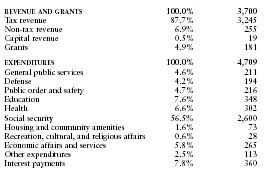Uruguay - Public finance
Under the inflationary pressures of the 1990s, budgetary expenditures generally exceeded revenues, although greater fiscal austerity caused a decrease in the budget deficit. In 1998, the number of government offices was reduced by one-third. The 1998 budget deficit was 0.9% of GDP, mostly financed by external loans ($685 million). Because of falling tax revenues and increased spending, the deficit rose in 1999.
The US Central Intelligence Agency (CIA) estimates that in 2000 Uruguay's central government took in revenues of approximately $3.7 billion and had expenditures of $4.6 billion including capital expenditures of $500 million. Overall, the government registered a deficit of approximately $900 million. External debt totaled $7.7 billion.
The following table shows an itemized breakdown of government revenues and expenditures. The percentages were calculated from data reported by the International Monetary Fund. The dollar amounts (millions) are based on the CIA estimates provided above.

| REVENUE AND GRANTS | 100.0% | 3,700 |
| Tax revenue | 87.7% | 3,245 |
| Non-tax revenue | 6.9% | 255 |
| Capital revenue | 0.5% | 19 |
| Grants | 4.9% | 181 |
| EXPENDITURES | 100.0% | 4,709 |
| General public services | 4.6% | 211 |
| Defense | 4.2% | 194 |
| Public order and safety | 4.7% | 216 |
| Education | 7.6% | 348 |
| Health | 6.6% | 302 |
| Social security | 56.5% | 2,600 |
| Housing and community amenities | 1.6% | 73 |
| Recreation, cultural, and religious affairs | 0.6% | 28 |
| Economic affairs and services | 5.8% | 265 |
| Other expenditures | 2.5% | 113 |
| Interest payments | 7.8% | 360 |
Comment about this article, ask questions, or add new information about this topic: